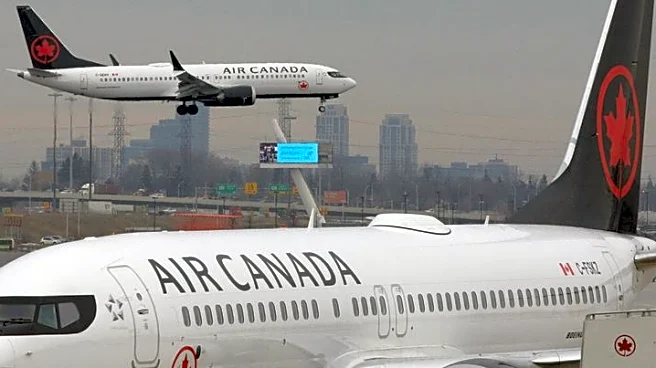What's Happening?
Delegates at the United Nations climate talks in Belem, Brazil, are struggling to reach consensus on proposals aimed at phasing out fossil fuels. The conference, originally scheduled to conclude on Friday, has extended into Saturday due to disagreements
among participating nations. A key point of contention is the lack of a clear roadmap for transitioning away from oil, gas, and coal, which are major contributors to global warming. The European Union and several other countries have rejected the current proposals, arguing they fail to address the urgent need for emissions reduction and a transition to renewable energy sources. The talks have been further complicated by a fire at the conference venue, which delayed proceedings.
Why It's Important?
The outcome of these negotiations is critical for global efforts to combat climate change. A successful agreement could lead to significant reductions in greenhouse gas emissions and accelerate the transition to renewable energy, impacting industries worldwide. Conversely, failure to reach a consensus could undermine international climate goals and exacerbate environmental challenges. Countries vulnerable to climate change, such as small island nations, are particularly concerned about the lack of progress, as their survival depends on effective global action. The talks also highlight geopolitical tensions, with oil-producing nations resisting measures that threaten their economic interests.
What's Next?
Negotiators are expected to continue discussions in smaller groups to find common ground. The Brazilian presidency is attempting to facilitate these talks by convening closed-door meetings with top officials from participating countries. The aim is to reach a compromise that satisfies both the need for a clear transition plan and the interests of nations reliant on fossil fuels. Observers anticipate further revisions to the proposals, with potential for a new text that could be more acceptable to all parties involved.
Beyond the Headlines
The deadlock at the UN climate talks underscores the complex interplay between environmental goals and economic interests. The resistance from oil-producing countries highlights the challenges of balancing climate action with economic stability. Additionally, the talks reveal the limitations of international diplomacy in addressing urgent global issues, as consensus often requires concessions that dilute the effectiveness of proposed measures. The situation also raises ethical questions about the responsibility of developed nations to support vulnerable countries in their climate adaptation efforts.















